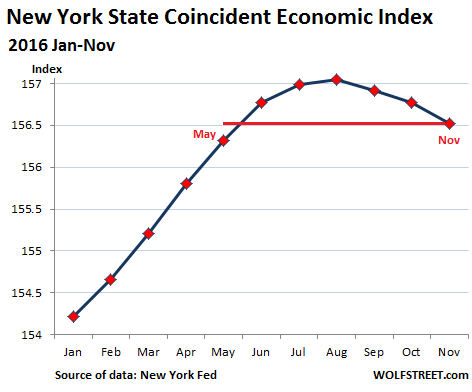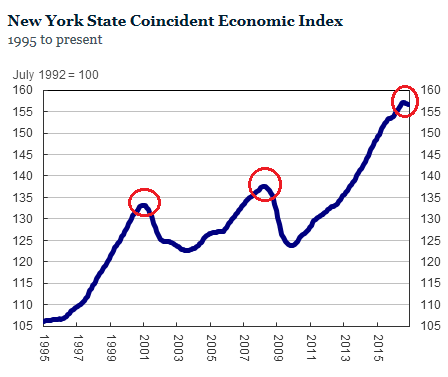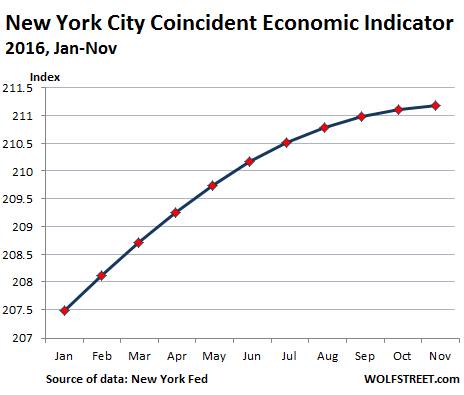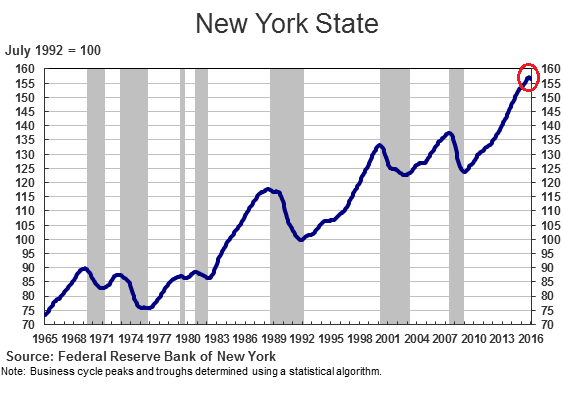Last time the index declined was in November 2009.
“Our Indexes of Coincident Economic Indicators (CEI) for November show economic activity declining for the 3rd straight month in New York State, flattening out in New York City, and remaining essentially flat in New Jersey”: so the New York Fed.
The CEI for New York State fell at an annual rate of 1.9%, following a 1.1% decrease in October, and a 1.0% decrease in September. The index is still up 1.9% over the past 12 months, but is now below where it had been in June and is just above its level in May:

The last time the index declined was in November 2009!
That’s why we’re paying attention to this. These indices, particularly for New York State and New York City, have an uncanny accuracy in moving with the national economy and turning south just before the business cycle for the nation turns south. And shortly after they turn south, a national recession begins.
But official recessions are based on hindsight. The National Bureau of Economic Research, whose job it is to declare official recessions, normally declares them only after they have already ended. The Great Recession was the exception. It lasted so long that the NBER decided that it existed even while it was still going on. That didn’t take a rocket scientist at the time, but that’s how the NBER works.
So we look for red flags beforehand. One monthly dip doesn’t make a trend. But the CEI for New York State declined for the third month in a row. And suddenly we have what might be the beginnings of a trend. And it hasn’t done that since the Great Recession.
The NY Fed’s 50-year chart below shows this relationship between national business cycles that end in recessions, and the CEI for New York State going back to 1965. The gray areas are not official recessions, as identified by the NBER, but are indications of when the business cycles contracted. The initial contraction period doesn’t perfectly align with the onset of official recessions but is very close:
That little dip of the past three months is hard to see on the 50-year chart above. But note how just about all the other little dips became big dips not much later, and how those big dips matched the end of the business cycle and subsequent recession.
The New York Fed’s 20-year chart shows this a little more clearly. Note the 2001/2002 recession and the Great Recession starting at the end of 2007:

The November CEI for New York City is starting to flatten out – a similar process the CEI for New York State went through over the summer. It edged up at an annual rate of 0.4%, after a 0.7% increase in October. The index is still up 2.5% year-over-year, but the chart shows how it is losing its momentum. The last time growth was this anemic was in October 2009, when it was still negative; by November 2009, the index had already begun to grow at a faster rate:

The November CEI for New Jersey edged down 0.02%, following a 0.4% decrease in October. While still up 1.3% year-over-year, the index peaked in August and has now declined for three months in a row. The last time it declined was in January 2011.
These coincident indicators are designed to track “the current state of the economy,” as the New York Fed explains:
The index is computed from a number of data series that move systematically with overall economic conditions. A rise in the index indicates an expansion of economic activity and a decline in the index indicates a contraction in economic activity. Each of the regional indexes is computed using data on employment, real earnings, the unemployment rate, and average weekly hours worked in manufacturing.
So these are serious indices for the New York-New Jersey region that in the past have mirrored the overall US economy. Now they’re heading south again for the first time since the Great Recession.
The move is not in a category where something “plunges” or “collapses” or “careens of the chart,” but it is a big red flag that afterwards might look like something we should have kept our eyes on.
Stocks have been immune to any sort of red flag. Read… IPOs Have Worst Year since 2003, and the Dow is at 20,000?
Enjoy reading WOLF STREET and want to support it? You can donate. I appreciate it immensely. Click on the mug to find out how:
![]()



Stocks are at an all time high. What could possibly go wrong?
Of course you meant this, “What ELSE could possibly go wrong?”
THIS: The consumer puts away her over-burdened credit card and closes her wallet.
THAT’s what else will go wrong.
Gonna be a wild ride.
SnowieGeorgie
Yes, absolutely and the consumer will put away his/her wallet. There are other indicators that the consumer is cashing out and strapped. Better get ready. Things are changing quickly. It’s gonna be a wild and horrible ride.
The stock market could accidentally sit on a thumb tack and POP
How did you get the Jan to Nov 2016 chart ?
Pure magic. Just kidding. I downloaded the entire data series (spreadsheet), took the bottom 11 data points, and created those charts. Both Jan-Nov charts are my own based on this data from the NY Fed. The other charts are from the NY Fed.
I saw this headline a few days ago:
http://nypost.com/2016/12/15/this-humongous-hamptons-manse-sold-for-half-off/
And this one:
http://nypost.com/2016/12/21/greenwich-village-duplex-owned-by-celeb-ish-couple-now-3m-off/
The long anticipated may finally be here so the next question is; how bad will this get? Maybe I should ask, how bad can it get?..
Badder than you’ve ever seen.
we live in such a PC AND BS world that even the data and how we collect data is manipulated to get the result they want resulting in bad or insufficient legislation and the result was the great recession by the end of 2007 .Its one thing for the fed to Gide the economy by adjusting interest rate settings.but its quit another to artificially medal with all this QE.( who the hell gave them the right to do that ) with all the distortions its caused and the resulting debt will finally catch up with us.with all the BS data that is going around its only a matter of time they will get it wrong .with artificially low interest rates, elevated debt and asset prices.for so long the day of reckoning will come and the price we pay maybe very high
I would put more blame on the accounting firms and the regulations and standards they were allowed to set for recognizing income and hiding expenses. The fantasy accounting was the reason Enron, World Com, and the rest of the hollow shells were able to attract investors. They even sold consulting services to big firms to teach them the ropes. The reality is that we have no idea what anything is really worth anymore.
The big accounting firms certainly enabled a lot of bad acts. And what about those rating firms? Remembering this criminality might make one a skeptic.
Many of the worst offenses were not related to the rating agencies, they are FASB related abuses and tax related strategies. Enron was a good example of accounting fraud on a grand scale.
Dec 13, 2016 Mike Maloney-Fed Endgame Is Inflation
Maloney warns that we may see deflation, but the end game for the Fed is inflation, and that is theft. Maloney says, “When they inflate the currency supply . . . this is the most immoral act because they are stealing portions of our lifetimes. Slavery is no longer legal.
https://youtu.be/RLnZnmLJWjA
You can buy a package of about a dozen Xmas cookies in William Sonoma for $24.95. But there is no inflation.
Too late. I blew the whole wad on their Peppermint Bark. :)
They’ve already inflated the currency supply with ZIRP and in some cases NIRP (global economy). This is fraud outright, not just unethical. The only end game to this is hyperinflation. I can’t see another way out. Too much currency floating around out there. I refuse to refer to it as money.
End game for the Fed is not inflation. That will be done by the US Government. By that time all will be lost.
Dec 22, 2016 Silver Buying Opportunities Ahead: Sneak Peak At 2016 Insider Wrap-Up – Mike Maloney
You’ll see the big picture: all the reasons Mike is still buying gold and silver, how Silk Road countries are impacting demand, and what precious metals investors can expect in 2017 and beyond. Mike also provides a full wrap-up of the Commitment of Traders (COT) reports and Fibonacci analysis to look for any indication of support in gold and silver prices.
https://youtu.be/w-beeZ1WkOw
Out in flyover country in a town I am visiting, I saw an article yesterday that sales tax revenue is down 4 months in a row . DON’T tell the market .
yes, things have been slowing for a while. and there’s a bit of a surplus of stuff, but not all stuff.
if inflation starts from a certain base point, is it inflation?
…and the weekly unemployment claims surged this week. One week doesn’t make a trend, but it’s worth watching. Layoffs are coming in the auto industry early next year. The housing market may have just ground to a halt due to the rise in mortgage rates to 4.3% today with house prices at record highs. China is falling apart financially. Europe is literally falling apart. Other than that, everything’s rosy!!
All together, there’s some grounds for caution here.
And the difference between 2007 and now?
1. Four trillion (or as a older Brit might say- 4 thousand billion) dollars of new debt
2. Interest rates that can’t be cut much if at all.
3. Boomer retirement really taking off- 10,000 a DAY retiring.
June 20006 Fed Funds Rate- 5.25%
Dec. 2008- 0 %
Dec. 2016- .75%
All powder shot off.
But it’s all going to be ok because The Donald is going to raise tariffs on China and build a wall.
Note a phrase creeping into most commentary about these ‘plans’:
“It’s not completely clear…”
Ain’t that the truth
Quite true it’s not completely clear, however, the free trade we had prior was working in favor of a select few.
The best way you can describe the NY-NJ-CT tristate area is ‘stagnant’. High rents suffocate the working class, while opportunities are few as companies have fled abroad. Talking about the suburban areas outside Manhatttan as that is its own unique world.
The new businesses I see are typically housing related (furniture, tiles, carpets) etc or medical related. So long as housing goes up mom and pop will have the cash to pay the doctor who then buys stuff at bed bath and beyond.
The true ‘citizens’ of this area are the platinum plated civil servants that I read Wolf seems to think are imaginary. I can assure you the vast majority of the civil servants in this area make high five or low six figures with platinum benefits. They almost all have life-time employment.
That’s why the pension funds are all under-funded!
That “lifetime employment” thing has got to end thats for sure Or replace most of them with computers/robots Done
I don’t know about the civil servants in the NY-NJ-CT area. But, I do know about them in my area and most positions pay somewhat to considerably lower than their private sector counterparts. And local, state, and Federal governments hire a wide variety of occupations and professions, including doctors, lawyers, scientists, and engineers. Most people in these professions won’t work for the same pay as a retail clerk. So, when a government entity needs to hire someone, they have to compete with the private sector. A decent benefit package helped bridge the pay gap, before the Koch Bros and friends decided to torpedo public sector pay and benefits. Now many of the public sector jobs are bad jobs with low pay and anemic benefits.
But, since these public sector workers are also tax payers and consumers, when they have less money and poor prospects, they don’t spend either. Just like real people. And another drag on the economy was born.
NY is eliminating all their toll collectors and replacing them with EZPass and cameras that will bill you if you are not signed up. Those toll jobs were good paying govt jobs. That’s another job sector totally automated.
“I can assure you the vast majority of the civil servants in this area make high five or low six figures with platinum benefits.”
This is almost certainly not true. And pension funds are underfunded due to chronic mismanagement and unrealistic pension accounting (assuming unreasonable rates of returns, for example, lowering required contributions).
Pension battles will get much more protracted in the coming years. The problems in Dallas, Chicago and other cities and some states like Illinois and California will keep growing until they can no longer be ignored. There will likely be some grand negotiation to set up a two-tier system as happened to some industries in the past, where new hires and perhaps less-tenured employees get a higher retirement age, more contributions for health care and fewer benefits.
The days are numbered for six-figure annual retirement payouts to a decreasing minority of employees although there is still plenty of graft and corruption here in California to extract some more from the public. There will be the usual gnashing of teeth about not keeping the bargain, such as that late 1990s Gray Davis sweetheart deal with the California Highway Patrol and the prison guards. The bills are coming due and the entrenched recipients won’t be able to endure the wrath of 38MM citizens who see their car registration payments (taxes) increase along with other taxes in our dysfunctional fiscality.
Jerry Brown may be in a ZFG position of not having to worry about re-election, but he still has a legacy to consider when navigating the Sacramento legislative bodies. Even his zen focus is not immune to practicalities.
The two tier system for government workers is already in place at the state level in many states.
What I’m waiting for right now is the retail spending for Christmas YoY.
If YOY Xmas spending is up, it is only because prices are high and inventories are visibly limited. The stores were not that crowded but the shoppers were definitely buying.
The stores dont need to be crowded anymore with so many doing all their shopping online today Next year may be alot worse but who knows anymore in this upside down world of ours
I’m feeling that IF spending is down significantly then that could put a pin prick in the markets balloon. As that should then reflect on the next quarter’s earnings in a negative way. But then again the Trumpitization Hurraw excitement seems to be over riding what I consider sane so who knows.
I’m not going to short this thing. I would just like to figure out how worried I should be short term. I want to take an extended vacation and would love to not have to go during the collapse.
I saw an infomercial on tv for a company that rents women’s clothing. You are not buying, you are renting using their catalogue. I believe it was a subscription model. You get an item for a limited time than send it back. It wasn’t even high end or designer clothing. I found the concept frightening. Are we at the point that people can’t even afford to own their own clothes?
Yes, poor government workers are the only ones who might lose their pensions. Oh I should mention, they’re the only ones I know of who have them.
I guess their job is to process green cards at the request of Corporate America to capture lower wages, or help them to off shore?
Your comment shows a cultivated ignorance of government workers.
My wife retired after 30 years service with state government. During her early career, I remember many people, upon learning what she did, telling her she should go to the private sector because of higher pay. She would cite her benefits including the pension plan, as why she stayed. And the Yuppie answer was always “No. The smart move is to get your money now and put it to work and control it yourself
Now, those folks are jealous of the people who stuck out the less glamorous jobs and have the defined benefit plans. And the cry goes out across the land “Kill the DFB pension plans”. When instead, it should be “We all deserve DFB plans”.